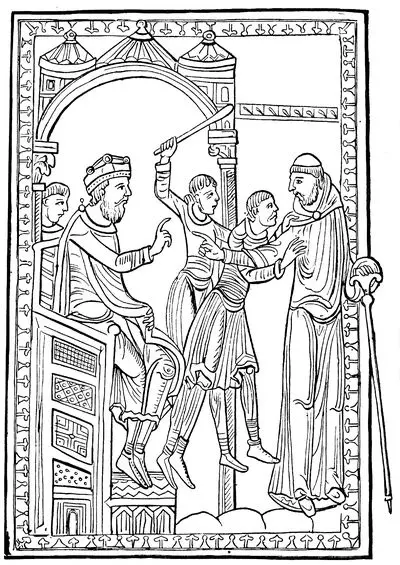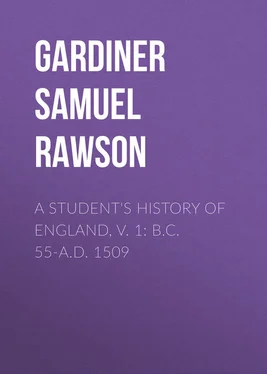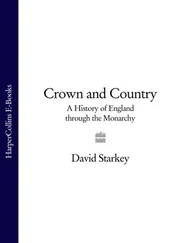Samuel Gardiner - A Student's History of England, v. 1 - B.C. 55-A.D. 1509
Здесь есть возможность читать онлайн «Samuel Gardiner - A Student's History of England, v. 1 - B.C. 55-A.D. 1509» — ознакомительный отрывок электронной книги совершенно бесплатно, а после прочтения отрывка купить полную версию. В некоторых случаях можно слушать аудио, скачать через торрент в формате fb2 и присутствует краткое содержание. Издательство: Иностранный паблик, Жанр: foreign_prose, История, foreign_antique, на английском языке. Описание произведения, (предисловие) а так же отзывы посетителей доступны на портале библиотеки ЛибКат.
- Название:A Student's History of England, v. 1: B.C. 55-A.D. 1509
- Автор:
- Издательство:Иностранный паблик
- Жанр:
- Год:неизвестен
- ISBN:нет данных
- Рейтинг книги:5 / 5. Голосов: 1
-
Избранное:Добавить в избранное
- Отзывы:
-
Ваша оценка:
- 100
- 1
- 2
- 3
- 4
- 5
A Student's History of England, v. 1: B.C. 55-A.D. 1509: краткое содержание, описание и аннотация
Предлагаем к чтению аннотацию, описание, краткое содержание или предисловие (зависит от того, что написал сам автор книги «A Student's History of England, v. 1: B.C. 55-A.D. 1509»). Если вы не нашли необходимую информацию о книге — напишите в комментариях, мы постараемся отыскать её.
A Student's History of England, v. 1: B.C. 55-A.D. 1509 — читать онлайн ознакомительный отрывок
Ниже представлен текст книги, разбитый по страницам. Система сохранения места последней прочитанной страницы, позволяет с удобством читать онлайн бесплатно книгу «A Student's History of England, v. 1: B.C. 55-A.D. 1509», без необходимости каждый раз заново искать на чём Вы остановились. Поставьте закладку, и сможете в любой момент перейти на страницу, на которой закончили чтение.
Интервал:
Закладка:
16. Dunstan.—Dunstan in his boyhood had been attached to Eadmund's court, but he had been driven off by the rivalry of other youths. He was in no way fitted to be a warrior. He loved art and song, and preferred a book to a sword. For such youths there was no place amongst the fighting laymen, and Dunstan early found the peace which he sought as a monk at Glastonbury. Eadmund made him abbot, but Dunstan had almost to create his monastery before he could rule it. Monasteries had nearly vanished from England in the time of the Danish plunderings, and the few monks who remained had very little that was monastic about them. Dunstan brought the old monks into order, and attracted new ones, but to the end of his days he was conspicuous rather as a scholar than as an ascetic. From Glastonbury he carried on the work of teaching an ignorant generation, just as Ælfred had done in an earlier time. Ælfred, however, was a warrior and a ruler first, and then a teacher. Dunstan was a teacher first, and then a ruler. Eadred took counsel with him, and Dunstan became thus the first example of a class of men which afterwards rose to power—that, namely, of ecclesiastical statesmen. Up to that time all who had governed had been warriors.
17. Archbishop Oda.—Another side of the Church's work, the maintenance of a high standard of morality, was, in the time of Eadred, represented by Oda, Archbishop of Canterbury. The accepted standard of morality differs in different ages, and, for many reasons, it was held by the purer minds in the tenth century that celibacy was nobler than marriage. If our opinion is changed now, it is because many things have changed. No one then thought of teaching a girl anything, except to sew and to look after the house, and an ignorant and untrained wife could only be a burden to a man who was intent upon the growth of the spiritual or intellectual life in himself and in others. At all times the monks, who were often called the regular clergy, because they lived according to a certain rule, had been unmarried, and attempts had frequently been made by councils of the Church to compel the parish priests, or secular clergy, to follow their example. In England, however, and on the Continent as well, these orders were seldom heeded, and a married clergy was everywhere to be found. Of late, however, there had sprung up in the monastery of Cluny, in Burgundy, a zeal for the establishment of universal clerical celibacy, and this zeal was shared by Archbishop Oda, though he found it impossible to overcome the stubborn resistance of the secular clergy.

A monk driven out of the King's presence.
(From a drawing belonging to the Society of Antiquaries.)
18. Eadwig's Marriage.—In its eagerness to set up a pure standard of morality, the Church had made rules against the marriage of even distant relations. Eadwig offended against these rules by marrying his kinswoman, Ælfgifu. A quarrel arose on this account between Dunstan and the young king, and Dunstan was driven into banishment. Such a quarrel was sure to weaken the king, because the support of the bishops was usually given to him, for the sake of the maintenance of peace and order. The dispute came at a bad time, because there was also a quarrel among the ealdormen and other great men. At last the ealdormen of the north and centre of England revolted and set up the king's brother, Eadgar, to be king of all England north of the Thames. Upon this, Oda, taking courage, declared Eadwig and his young wife to be separated as too near of kin, and even seized her and had her carried beyond sea. In 959Eadwig died, and Eadgar succeeded to the whole kingdom.
CHAPTER V.
EADGAR'S ENGLAND
1. Eadgar and Dunstan. 959—975.—Eadgar was known as the Peaceful King. He had the advantage, which Eadwig had not, of having the Church on his side. He maintained order, with the help of Dunstan as his principal adviser. Not long after his accession Dunstan became Archbishop of Canterbury. His policy was that of a man who knows that he cannot do everything and is content to do what he can. The Danes were to keep their own laws, and not to have English laws forced upon them. The great ealdormen were to be conciliated, not to be repressed. Everything was to be done to raise the standard of morality and knowledge. Foreign teachers were brought in to set up schools. More than this Dunstan did not attempt. It is true that in his time an effort was made to found monasteries, which should be filled with monks living after the stricter rule of which the example had been set at Cluny, but the man who did most to establish monasteries again in England was not Dunstan, but Æthelwold, Bishop of Winchester. Æthelwold, however, was not content with founding monasteries. He also drove out the secular canons from his own cathedral of Winchester and filled their places with monks. His example was followed by Oswald, Bishop of Worcester. Dunstan did not introduce monks even into his own cathedrals at Worcester and Canterbury. As far as it is now possible to understand the matter, the change, though it provoked great hostility, was for the better. The secular canons were often married, connected with the laity of the neighbourhood, and living an easy life. The monks were celibate, living according to a strict rule, and conforming themselves to what, according to the standard of the age, was the highest ideal of religion. By a life of complete self-denial they were able to act as examples to a generation which needed teaching by example more than by word. How completely monasticism was associated with learning is shown by the fact that the monks now established at Worcester took up the work of continuing the Chronicle which had been begun under Ælfred (see p. 61).
2. The Cession of Lothian.—It is said that Eadgar was once rowed by six kings on the river Dee. The story, though probably untrue, sets forth his power not only over his own immediate subjects but over the whole island. His title of Peaceful shows that at least he lived on good terms with his neighbours. There is reason to believe that he was able to do this because he followed out the policy of Eadmund in singling out the king of Scots as the ruler whom it was most worth his while to conciliate. Eadmund had given over Strathclyde to one king of Scots. Eadgar, it is said—and probably with truth—gave over Lothian to another. Lothian was then the name of the whole of the northern part of Bernicia stretching from the Cheviots to the Forth. In Eadred's time the Scots had occupied Eadwinesburh ( Edinburgh ), the northern border fortress of Bernicia (see p. 43), and after this the land to the south of that fortress must have been difficult to defend against them. It is therefore likely that the story is true that Eadgar ceded Lothian to Kenneth, who was then king of the Scots, especially as it would account for the peaceful character of his reign. Kenneth in accepting the gift no doubt engaged to be faithful to Eadgar, though it is impossible to say what was the exact nature of his obligation. It is of more importance that a Celtic king ruled thenceforward over an English people as well as over his own Celtic Scots, and that ultimately his descendants became more English than Celtic in character, through the attraction exercised upon them by their English subjects.
3. Changes in English Institutions.—The long struggle with the Danes could not fail to leave its mark upon English society. The history of the changes which took place is difficult to trace; in the first place because our information is scanty, in the second because things happened in one part of the country which did not happen in another. Yet there were two changes which were widely felt: the growth of the king's authority, and the acceleration of the process which was reducing to bondage the ceorl, or simple freeman.
Читать дальшеИнтервал:
Закладка:
Похожие книги на «A Student's History of England, v. 1: B.C. 55-A.D. 1509»
Представляем Вашему вниманию похожие книги на «A Student's History of England, v. 1: B.C. 55-A.D. 1509» списком для выбора. Мы отобрали схожую по названию и смыслу литературу в надежде предоставить читателям больше вариантов отыскать новые, интересные, ещё непрочитанные произведения.
Обсуждение, отзывы о книге «A Student's History of England, v. 1: B.C. 55-A.D. 1509» и просто собственные мнения читателей. Оставьте ваши комментарии, напишите, что Вы думаете о произведении, его смысле или главных героях. Укажите что конкретно понравилось, а что нет, и почему Вы так считаете.












